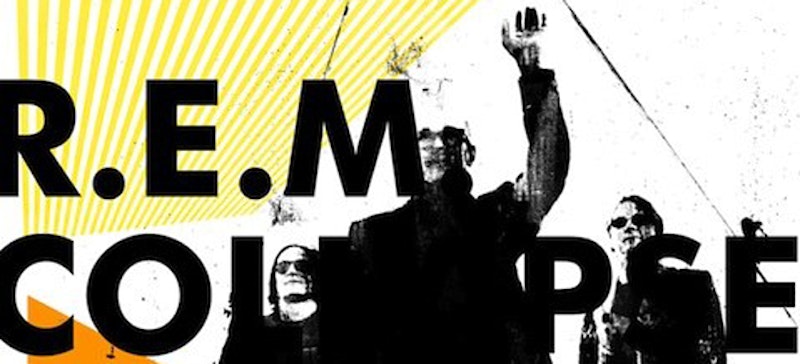I guess it really does come down to Bill Berry. Not that the plodding beats laid down by R.E.M.’s founding drummer—who retired for health-related reasons in 1997—were in any way irreplaceable, but the band’s been lost for most of the last 14 years. Latest case in point: New album Collapse Into Now.
Or maybe it’s the absence of first manager Jefferson Holt, who left in 1996 amidst never-officially-confirmed reports of temper tantrums, sexual harassment, jealousy and the like. Holt was immortalized in the evocative line “Jefferson, I think we’re lost” on early favorite “Little America” (which, lately, has been revised to “Washington, I think we’re lost”—less effective for a number of reasons).
Or maybe R.E.M. just doesn’t give a fuck anymore.
I think that’s unlikely, given all the hoopla that attended its last studio album, 2008’s short-n-speedy Accelerate, which netted rave reviews in a lot of corners, and even a feature on the normally stodgy CBS Sunday Morning program.
Accelerate still (mostly) holds up, but the three ensuing years have further sapped R.E.M.’s relevance. Once held in awe by alternative nation—despite the $80 million contract signed with Warner Bros. in ’96—R.E.M.’s every pronouncement was pounced upon with a vigor rarely seen since Dylan’s heyday. What was “Nightswimming” really about? Why did it take singer Michael Stipe so long to come out? Which was the more perfect album: Out of Time or Automatic for the People?
With the ham-handed Berry out of the way, the group delivered its most experimental and underrated work, 1998’s Up. And there began the trouble: Having willfully foregone writing hits, a fanbase confused by the subtleties of “Sad Professor” and “Diminished”—where were the anthemic singalongs like “Losing My Religion” and “Everybody Hurts”?—decided it preferred its lyrical obtuseness to be delivered by the infinitely younger, hipper (fitter, happier) Radiohead.
Stung by the rejection, R.E.M. retreated to the world of safe pop, and the hits just didn’t keep on comin’. 2001’s Reveal came off as alternately half-assed and bitter, while 2004’s Around the Sun made absolutely no impression whatsoever. Accelerate was an all-hands-on-deck attempt to return to its roots, but Collapse Into Now—possibly the most on-the-nose album title of its career—finds the band back in lazy, will-this-do? mode.
And true to form, nobody’s paying much mind to a band that’s still working through that $80 million contract. The group’s commissioned videos for every single track, directed by Stipe and, inevitably, James Franco, but there’s no buzz to speak of. Where once the prospect of a new R.E.M. album would be greeted with the kind of palpitations that set in when Radiohead and P.J. Harvey put out their latest, there’s been a collective shrug at a new R.E.M. title. Were you even aware that a single came out in January?
The new one starts out with generic curtain-raiser “Discoverer,” all clanging guitar and bellowing vocals, not a million miles away from “Finest Worksong” or “What’s the Frequency, Kenneth?” although the lyrics are disappointingly facile. (Is that an invocation of Betty Furness? No; it’s a “bit of finesse.”) Feeling similarly dashed off are of “It Happened Today” (“Hooray, hooray”) and the introspective waltz “Every Day Is Yours to Win”: “I’m nothing but confused/With nothing left to lose/And if you buy that/I’ve got …”—what, Mike? A feeling? A brand new pair of roller skates? Nope: “A bridge for you.”
The disc isn’t an entirely lost cause. The gentle, acoustic-tinged “Überlin” is pleasant enough, while “Oh My Heart,” with its horn and accordion accents, would have fit in nicely on Out of Time. (There’s even a bit of self-awareness on display with “All the Best,” wherein Stipe admits, “It’s just like me to overstay my welcome.”)
But at nearly every turn this is a band on auto-pilot (for the people?). “Alligator Aviator Autopilot Antimatter” tries to evoke the Stooges; “Me, Marlon Brando, Marlon Brando and I” won’t make anyone forget Neil Young’s “Pocahontas” when its comes to Brando tributes; and the concluding “Blue,” with Stipe’s longtime demigoddess Patti Smith on hand, is a mumbly spoken-word bit that compares unfavorably with the Mekons’ “Psycho Cupid.”
With Stipe and company this uninspired, maybe they should just sit on those royalties of better days gone by. And if this really is the end of the road for R.E.M., I feel fine.

